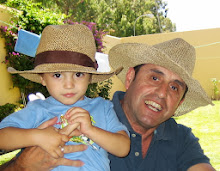I had never seen Paris in the snow. It's freezing cold, but it's just as beautiful as ever. I'm having a wonderful time with my family -specially with my little grandson, Leo. From Paris a thought for my students in Spain. See you very soon.
Sunday, 31 January 2010
Cold weather... wonderful time in Paris
I had never seen Paris in the snow. It's freezing cold, but it's just as beautiful as ever. I'm having a wonderful time with my family -specially with my little grandson, Leo. From Paris a thought for my students in Spain. See you very soon.
Friday, 29 January 2010
International Day of Peace and Non-Violence
 Spanish schools tend to celebrate the International Day for Peace on January 30th, the day of Mahatma Gandhi's death.
Spanish schools tend to celebrate the International Day for Peace on January 30th, the day of Mahatma Gandhi's death.
Many other countries and also the UN, celebrate this day on March 21st. The date is not so important as long as we take the opportunity to reflect about the meaning of peace and what we can do in order to achieve it.
Peace One Day has a website full of ideas and initiatives to bring peace to the world. It is worth paying a visit (watch video Peace one day in 60 seconds). Jeremy Gilley, founder and chairman of Peace One Day brought up the idea to fix in the calendar one day of ceasefire and peace. That day ended up being Sept 21st. In the following video he explains how he did it.
Tuesday, 26 January 2010
Colour idioms with The Teacher
"The Teacher" from the BBC is going to help us today to become familiar with some "colour idioms". Have a look at this video explaining some idioms connected with colour green:
- To have green fingers
- The grass is always greener on the other side
- To be green with envy
And this one about colour gold:
- As good as gold
- A heart of gold
- Worth its weight in gold
Have fun.
Labels:
Idioms,
Listening,
Videos,
Vocabulary
Sunday, 24 January 2010
Tired or tiring? Crossword

There is an important group of pairs of adjectives in English ending in -ed or -ing. Their correct use is confusing for many students. In this crossword you can practise some of them. Good luck!
Wednesday, 20 January 2010
Haiti devastated by massive earthquake
Last January 12th the Caribbean country of Haiti was struck by a 7.0 magnitude earthquake. This is how the BBC reported this terrible event the following day.
A week later the government has reported more than 100,000 deaths, and thousands of people are still missing. Relief teams and aid are arriving from all over the world but there are terrible problems of organization and infrastructure to reach the victims.
The CNN is covering the disaster in full detail.
We want to express our solidarity with the people and the nation of Haiti.
Wednesday, 13 January 2010
And tomorrow... THEATRE
 Our class is going to the theatre tomorrow. We're going to watch "Pygmalion" a classical play by George Bernard Shaw. If you want to find out a bit more about the company which is going to perform, click here. I hope we all enjoy the show and have a good time. See you there!
Our class is going to the theatre tomorrow. We're going to watch "Pygmalion" a classical play by George Bernard Shaw. If you want to find out a bit more about the company which is going to perform, click here. I hope we all enjoy the show and have a good time. See you there!Saturday, 2 January 2010
Clauses of Cause and Reason
Some days ago we talked about "purpose clauses" (they answer the question "what for?") and today we want to talk about "clauses of cause and reason" (they answer the question "why?").
If we look carefully we will realize that they are two different concepts. Broadly speaking we could say that the "purpose" looks ahead and generally has to do with ourselves, with our personal intentions or objectives, while the "reason" usually looks back and often has to do with other people's impositions upon us. Some people mix them and when you ask "why?" they answer... "in order to..." or when you ask "what for?" they come up with "because..."
The Beatles have an appropriate song to illustrate this question: "Tell me why" (lyrics)
And of course they also have a song to illustrate the answer: "Because" (lyrics)
Subscribe to:
Comments (Atom)




